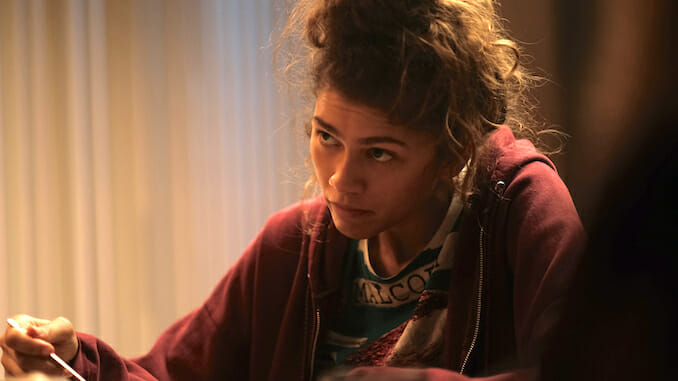Is Euphoria Even Good?
Photos Courtesy of HBO
An internet sensation. A showcase of some of the best young up and coming actors. A daring look at the inner lives of teenagers. A sensory overload. A pretentious pile of nothing. A cultural phenomenon. A cultural mistake. HBO’s Euphoria could be called all of these things. But could it be called…good?
Euphoria is sold on its style. In the end, that’s the show’s artistic goal and its greatest claim to quality. Any argument against its tendency for excess is fundamentally flawed. Euphoria is excess. You cannot change that without asking for a different show entirely. Swinging cameras, spotlights, fourth wall breaks, a collage of characters and emotions colliding together as Labrinth’s score brings it all together (admittedly, the score and music direction are Euphoria’s best aspects by far).
In Season 2, Euphoria wants to develop its style. The neon-colorful lights and flipping camera of Season 1 have been replaced by golden spotlights, a grainy filter, and viewing its characters as portraiture. But despite its stylistic progress, the show is leaving its plot and characters behind.
The characters of Euphoria are Euphoria. The names Rue, Jules, Kat, Cassie, Nate, and Maddie are cemented in the heads of the young people who obsessively watch the show. Their deeply personal struggles and defined character archetypes are what keep people watching, as viewers sit on the edge of their seats and wait for any of them to experience just one thing that goes right in their lives.
In writing there is a lesson you learn early on: you have to be a little cruel to your characters. Punish your darlings. Your characters need conflict and loss to propel the narrative. Series writer and creator Sam Levinson has seemingly taken this to the extreme. His characters know only misery. The show’s very title—Euphoria—is an argument against embracing joy, that even when things are good it will be fleeting.
Euphoria is just the latest addition to television’s pantheon of shows about high schoolers. But where Euphoria falls in this genre is confusing. The outrageous plotlines and high octane drama aligns it with the likes of Degrassi or even Secret Life of an American Teenager. But it also has the insanity and plentiful subject matters of Rivderdale and Glee, as well as the attempts at honesty and empathy of Sex Education.
Euphoria wants to be everything all the time. That’s what makes it interesting, but it’s also what makes it weak. It’s not the first high school show to embrace insanity, but it seems to be the first that thinks itself above the format it’s clearly based on. Levinson and company seem to think they are exposing a raw truth for the first time, that Euphoria is paving new ground in its daring. But just because it can be controversial, it doesn’t mean that the subjects it attempts to shed light on are treated well. Levinson seems to think that just containing shocking acts gives the show a backbone.
-

-

-

-

-

-

-

-

-

-

-

-

-

-

-

-

-

-

-

-

-

-

-

-

-

-

-

-

-

-

-

-

-

-

-

-

-

-

-

-








































